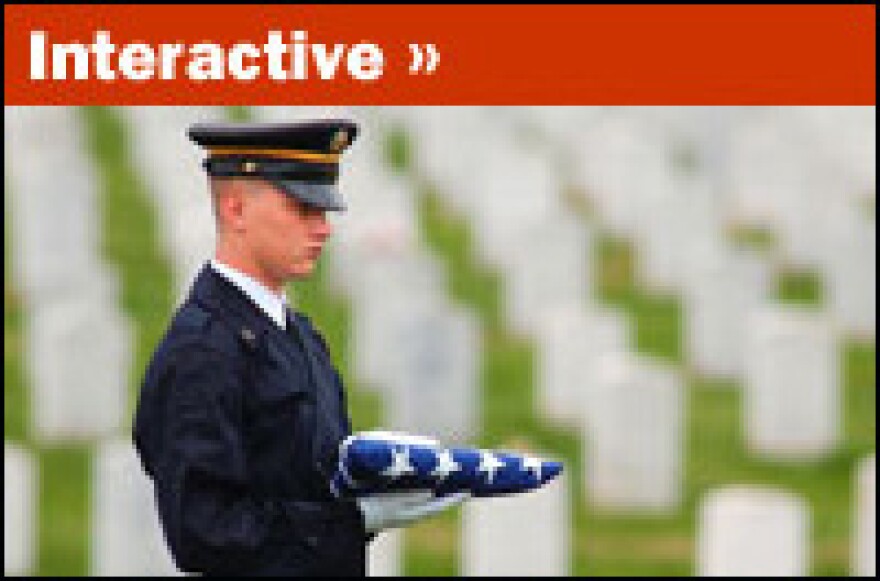




At a high school in Killeen, Texas, the imprint of the Iraq war is felt every day, by virtually every student.
Killeen is home to Fort Hood, where the Army's Fourth Infantry and First Cavalry divisions are based. The two divisions have alternated deployments through the last four years of war.
About 90 percent of the 2,000 students at Shoemaker High School have at least one parent in the military. The school's hallways are adorned with big, royal blue and silver cardboard stars. There is one for every parent who has been deployed to Iraq since the war began.
School counselor Barbara Critchfield and some colleagues had the idea for the stars soon after the war began. She recalls that they bought 80 stars with their own money, at 84 cents each.
But when they surveyed the students, they realized they didn't have nearly enough. They bought a thousand more, and then a thousand more.
And hanging above the school's entrance are seven gold stars — one for each parent who has died in Iraq. Critchfield says she often looks up as she walks through the halls.
"And a name will pop out, and I'm like, 'Oh, I need to check on him or I need to check on her,'" she says.
The absence of parents is inescapable. Once, after a football game, the opposing school sent Shoemaker a plant.
"They had noticed the absence of parents on our side of the stadium during the football game. And it struck them so hard, and they realized that our kids were doing all this without parents," says Critchfield.
Shoemaker has had four principals in three years. All the counselors are new this year, except Critchfield, who has been at the school for six years.
For students, life is filled with the usual teenage concerns: exams, football practice and young love. And yet, the war overshadows everything.
Take Eugene Daniels. The senior will play football at Colorado State next year. On a recent day, he was carrying a memory book filled with family photos. But there are just three or four pictures of his father, an Army lieutenant colonel in military intelligence.
"They're probably when my sister and me were born," Daniels says of the photos of his father. "So he's been gone quite a lot. Every time they go somewhere, he's deployed."
Since 2001, his father has been home for a year's duration just once. Many responsibilities fall on Daniels' shoulders.
"It's a lot on the students, because we're just teenagers, and I think a lot of time we forget that, because you have to grow up so fast," he says.
Critchfield says with so many parents away, school attendance has fallen. Students' grades start to slip, so fewer are graduating. The school also is seeing more discipline problems.
She also says some students worry their mothers might commit suicide while their fathers are deployed. As a result, the kids stay up all night, keeping watch.
And it's not just the students. Many teachers at Shoemaker have a spouse who has been deployed in Iraq.
Cynthia Kovach teaches art at the school, and her husband is in Iraq with the 1st Cavalry. He came home from his last deployment with what she calls "really bad" post-traumatic stress disorder.
Kovach says the longer the war goes on, the more she sees the effects on her students.
Senior Amanda Gillinger's mother is a fueler with the 4th Infantry. Gillinger's best friend is Allissa Richards, whose stepfather is a driver with the 1st Calvary and is currently in Iraq.
"What's really sad is that last goodbye could be your last goodbye — that last time you're there with that person," says Richards.
Gillinger recalls, with regret, yelling at her mother the day before she left Fort Hood for her deployment.
"We fought. I was hateful. Everything you do, you regret. You can't go back and change it. I can't say 'Mom, I'm sorry,' because she's not there. And that is devastating," Gillinger says. "You're not the same after something like that. You can't be, because it takes you and twists you and turns you, and you come out with something totally new."
Gillinger and Richards both say they don't watch the news, and they don't want to know where in Iraq their parents are deployed: They don't want to be even more frightened than they already are.
For now, the seniors at Shoemaker High are looking ahead to graduation in May. They are hoping their parents will be there, but as they've learned over the last four years, they can't count on it.
NPR's Melissa Gray produced this story.
Copyright 2023 NPR. To see more, visit https://www.npr.org.


